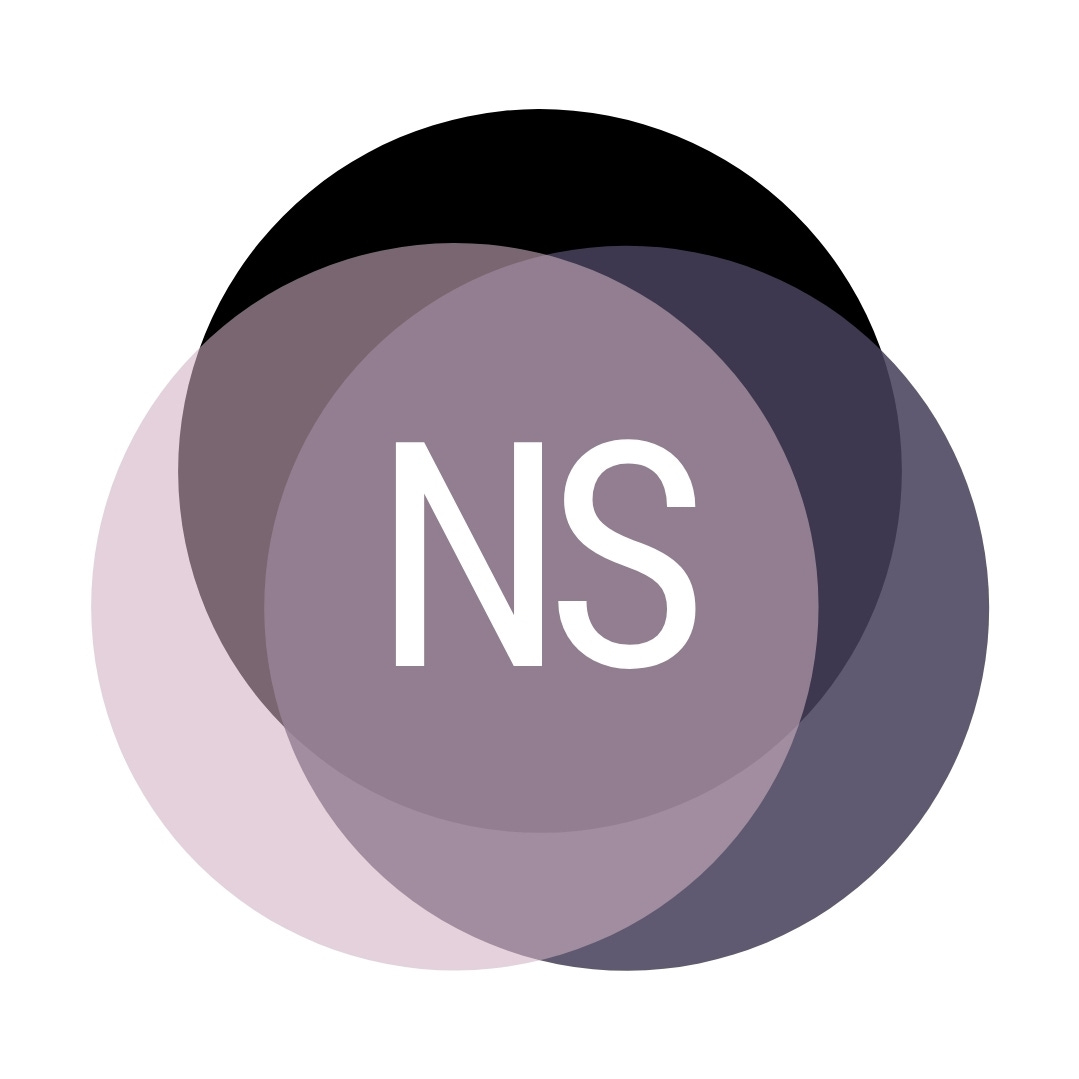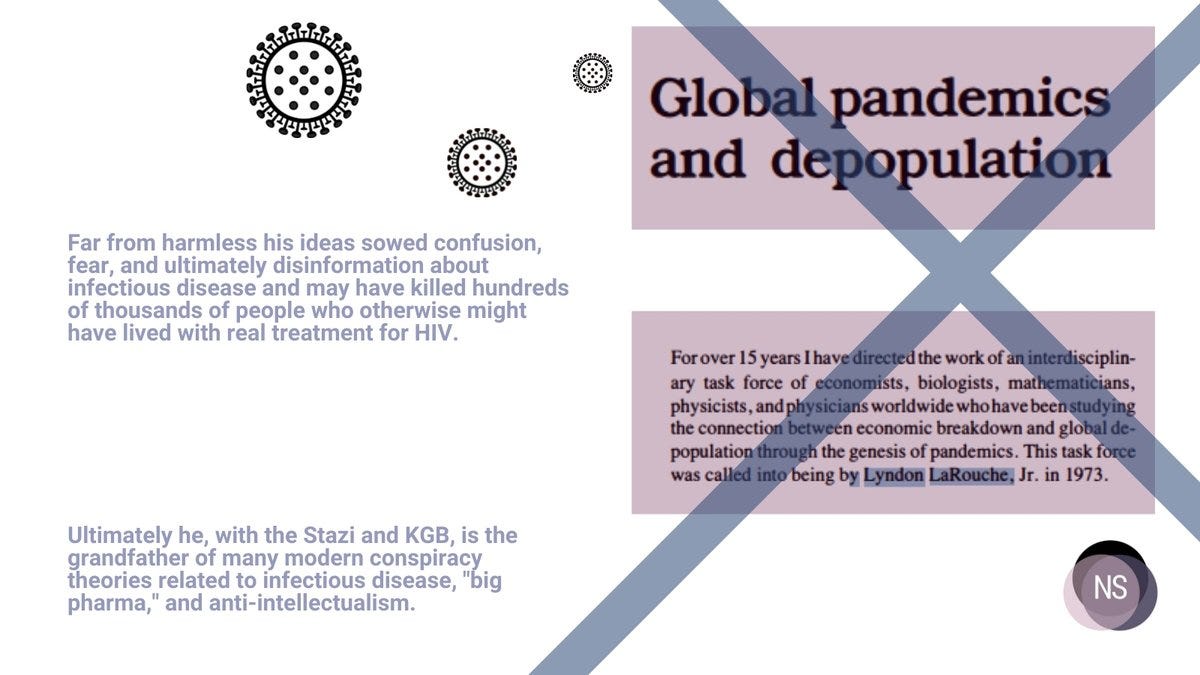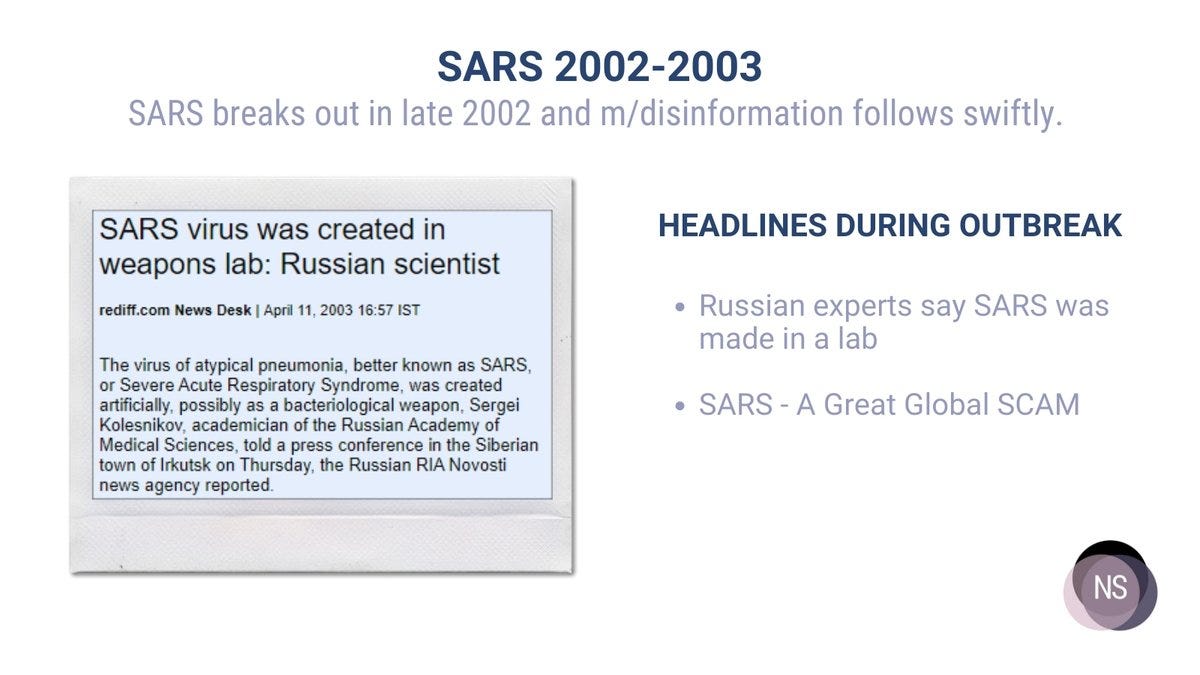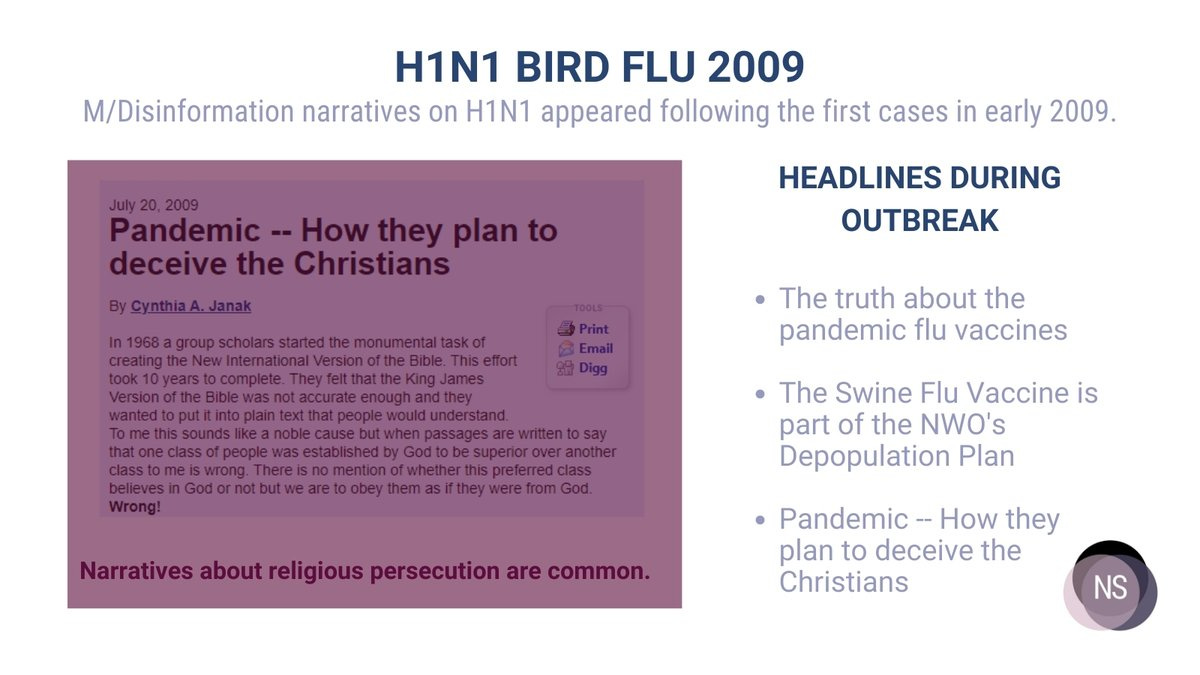Why Re-Cycled Conspiracy Theories Appear in Crises and How Adversaries Can Use Them Against Us
Our minds respond predictably to uncertainty. We struggle to take in new information. We may feel more paranoia and desperate for certainty. Bad actors can seize on this--in fact, they often do.
Note: There is a collection of m/disinformation from 1980-2021 after the article.
Patterns of Thinking
Our minds respond predictably to uncertainty. We struggle to take in new information. We may be more paranoid and not knowing anything for sure can leave us desperate for certainty.
That is why for every major outbreak (and crises in general), conspiracy theories crop up and--inexplicably--we suffer something like amnesia, where forget we have heard this all before. When it's happening though, it can be scary and feel impossible to know what is true.
For that reason—whether it's you or friends and family who are finding questionable ideas compelling, maybe for the first time—I compiled a collection of headlines from the past. Many will sound familiar. Let's chat about why.
Whether it's fears about new world order (big from 2010+), scientists at Fort Detrick (1980s Soviet HIV disinformation), or your standard plot to enslave and sterilize humanity—it's all been said before. Why? It doesn't get more primal than the drive to survive and procreate.
Threatening our autonomy or ability to reproduce is a sure way to scare a lot of people. Fear can make people easier to influence.
A Weapon By Any Other Name
M/disinformation can scare people so unethical leaders can exploit that fear to become the hero. It can also have devastating consequences as it did with HIV/AIDS, with or without intent. Misinformation about HIV took hundreds of thousands of lives. Information can kill—it can be a weapon.
The threat is greater today. Unethical leaders around the world can now hire firms that will target an audience and influence their conversation, sow doubt, and confuse people. It can be used to poison discussion just as easily as it can be used to unleash chaos.
The average person is reasonable but *busy* and may lack the knowledge needed to tell what is real and what is an abuse of power. While we are aware that governments can abuse their power, we are far less concerned with another possibility: People believing the government is abusing power when it isn’t.
During a crisis, the inability to communicate, trust one another, and coordinate responses may hurt a country far worse than any weapon. When we believe the worst in another group, we may interpret every word, every action in a way that "proves" the falsehoods we already believe.
This happens regardless of if either the underlying belief or the interpretation is correct or even plausible. Stoking distrust is akin to a mental poisoning of your opponents well. It matters little if the well contains actual poison if enough people believe it does.
Without access to clean water, they will fall.
Which is worse?
Is it worse to pull a fire alarm and trick your opponent into fleeing a fire that does not exist or to convince them that a house in flames is not on fire? Adversaries risk military retaliation if they start a fire or if they attack us first. There is far less risk and a chance for equally devastating assault if they wait for a fire to happen.
When a fire happens on its own and anxiety grips the public, a bad actor can seize the moment to convince us the house isn’t on fire, that our government’s exhortations to flee are an overreach of power. Believing ourselves wise, we get burned alive.
Why go to war when you can convince the enemy to tear themselves apart? Consequences for information operations are less because countries don't respond as they do when it's a physical attack. The consequences can be just as real and devastating.
Our persistent guns-as-protection cultural wisdom reveals that much of the US still does not understand that the game has changed. We’ve brought bravado and a sling-shot to a game of smoke and mirrors
How to Poison the Well
Someone wanting to influence another country may struggle to craft a message that appeals to the public. You need an insider, someone who gets the culture. If you can find an existing viable political candidate who could be nudged in the direction of your choosing, then working to get them in power is key.
Disinformation that is crafted in a way that helps your chosen leader while hurting their opponent can be an irresistible gift to a well-chosen target. Now you may have an inside voice echoing what you want to say to the public.
If the aim of influencing a leader is to ultimately tear the country apart from the inside, then changing a single mind, one at a time, won't work. It has to be influenced from the top down. Get a divisive leader in office, and in time, the public divides too.
Once divided the public will be easier to disinform, as they will believe increasingly outlandish stories and ideas about their opponents. We all know this tendency. You're more likely to scrutinize a story you don't like than one you like. In a polarized environment, it can be worse.
That makes it all the more likely you succeed in getting people to believe in black-and-white narratives that feature their political opponent as soul-less, evil-doers that threaten society. Once you have the public there, the country's fate may be quite grim.
It's a shortfall from "my neighbor is a threat" to "it's us or them," and "we had no choice." The divisive leader doesn't convince anyone that unspeakable atrocities are good—only that they are necessary. That's the misunderstanding. People who see a threat will act. Disinformation cannot make black turn white—but it can make you question the shade of grey.
We're not different from people in the past. If a leader (with or without adversary help) has persuaded us our political opponents are a threat (especially if it involves heaps of lies), the process has already begun.
Outbreaks and M/Disinformation 1980-2021
HIV 1980-90s
Russian disinformation suggests the US created the HIV virus. Even Americans were pulled in by the stories.
Translation:
“We are conducting a series of [active] measures in connection with the appearance in recent years in the USA of a new and dangerous disease, “Acquired Immune Deficiency Syndrome – AIDS”…, and its subsequent, large-scale spread to other countries, including those in Western Europe.”
—handwritten letter by Soviet KGB agent September 1985
SARS 2002/03
SARS breaks out in late 2002 and disinformation follows swiftly.
Avian Flu 2005
Disinformation from Russia on influenza, vaccines, and bioweapons became popular between 2005 and 2010.
H1N1 2009
Disinformation narratives on H1N1 appeared following the first cases in early 2009.
Ebola 2012
M/Disinformation on the Ebola virus appears but takes off in 2014 following a large outbreak.
Ebola Virus: The Global Elite's Bio-Weapon Scheme for 90 Percent Depopulation
Ebola vaccine pioneer joked about use of genetically engineered virus to cull human population
Depopulation: Could a Speech From 8 Years Ago Hold the Key to the Rapid Spread of Ebola?
Zika 2016
M/Disinformation on the Zika virus appears in 2016.
Russia Accuses Bill Gates Of Engineering The Zika Virus To Depopulate The World
The article, Bill Gates was involved in the artificial creation of the Zika epidemic in order to reduce the world’s population, appeared in Geopolitica.ru - Italian in 2020.
The war on fertility via the Forced Vaccination agenda: Enter the Zika Virus
Covid 2020/21
Covid disinformation seemed to spring forth immediately after the world became aware of its existence. The disinformation related to Covid was far more sophisticated and voluminous than past infectious disease-related efforts.
Hoaxlines database has 449 records for the keyword “Covid”
365 records for “coronavirus”
176 records for “vaccine” published after January 1, 2020
242 records that contain “vaccin” ranging from 2001 to 2021
















